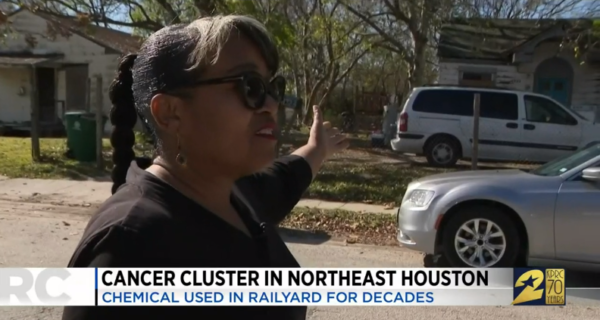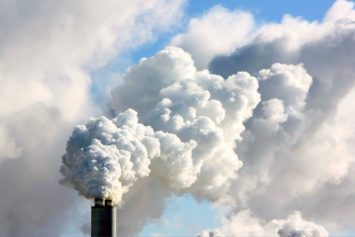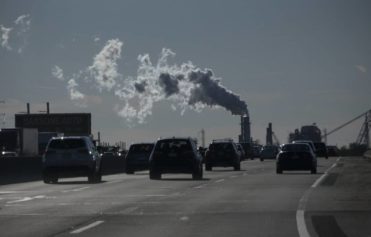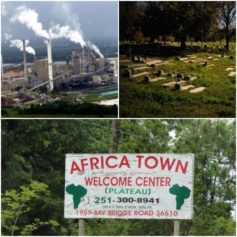Kashmere Gardens, a historically Black neighborhood in northeast Houston, is tucked between an industrial lot and a rail corridor that runs through the city. These days the quiet community is abuzz after residents learned their own community could be killing them.
A recent report by the Texas Department of State Health Services confirmed neighbors are living in the middle of a cancer cluster. The study, released in August, found higher than normal diagnoses of the life–threatening disease among residents in the Kashmere Gardens and Fifth Ward neighborhoods.

A state study confirming a cancer cluster in two northeast Houston neighborhoods has left local residents concerned. (Photo: Click 2 Houston / video screenshot)
“All our neighbors are dead,” concerned resident Sandra Edwards told local station KTRK. “We have one, two, three, four original people. Everyone else has died off from cancer.”
Now neighbors are calling on the state to clean up the toxic mess that’s been endangering their lives for years.
Many like Edwards said their community has long been plagued by a spike in deadly cancer. They said the issue has persisted for years due to the now-shuttered Union Pacific rail yard nearby.
According to Click 2 Houston, ground soil near the yard has tested positive for creosote, a wood preserving chemical. Workers would treat the wooden rail ties in the yard, causing the carcinogenic chemical to seep into the soil. The result? A dangerous plume that spread beneath more than 100 homes and churches in the area.
Moreover, the chemicals also leached into the ground water.
Edwards said the recent report’s findings only confirmed what she and others have known all along.
“Our neighborhood is contaminated from Union Pacific,” she said, adding, “Since [Union Pacific has] been knowing this information, you sit on it for two decades, now you need to come out here and clean this neighborhood up.”
For the study, researchers tested areas of historic Fifth Ward and Kashmere Gardens after residents, including Edwards, voiced concern about the water quality and what they saw as higher than normal rates of cancer diagnoses among people in their communities. Analyzing data from the Texas Cancer Registry between 2000 and 2016, researchers compared rates of cancer in the area to “what would be expected for the area based on cancer rates in Texas.”
What they found was startling.
“Based on the cancer rates in Texas, lung and bronchus, esophagus, and larynx cancers were statistically significantly greater than expected,” the study concluded.
In Fifth Ward alone, the state identified 10 areas with a significantly higher than normal number of reported cases of throat, esophagus and lung cancers, according to the report. Local resident Richard Hudson said he wasn’t surprised by the findings, seeing as he feels his own family has been impacted by the contaminants.
“My mom died from ovarian cancer, and my brother from stomach cancer,” he told KTRK. “I don’t think it’s a coincidence.”
While the report does not identify the specific cause of the cancers, the Environmental Protection Agency (EPA) has linked the deadly disease to exposure to chemicals found in the underground plume.
Even after all this, residents say the state and Union Pacific have done little to address their concerns. They’ve since banded together to launch IMPACT, Greater Fifth Ward, a community group dedicated to spreading awareness about the contamination.
“Why can’t we live in clear air and clean neighborhoods like everybody else?” Edwards asked.
Union Pacific addressed the controversy, saying it understands residents’ concerns and has since reached out to the Texas Department of State Health Services about the study’s findings.
Watch more in the video below.


